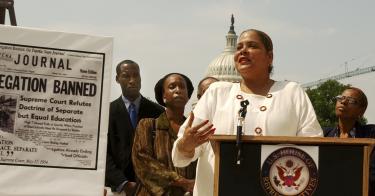When Virginia Walden Ford crossed the threshold of her new high school in Little Rock, Arkansas, as one of the second wave of black students to integrate the school, little did she know these were her first steps in a lifetime journey to champion educational opportunity for all children.
Ford would go on to help nearly 11,000 children attend their school of choice in Washington, D.C., and her story would be featured in the forthcoming movie “Miss Virginia.”
During the 1990s, Ford was a single mom of three children in Washington, D.C. She was shocked at the condition of the local public schools, where eighth-graders were performing three grade levels below their peers across the nation in mathematics, according to the National Assessment of Educational Progress.
As The Washington Post reported, “On average, for each additional year that students stay in DCPS, the less likely they are to succeed, not because they are unable to succeed, but because the system does not prepare them to succeed.”
Moreover, a culture of drugs, crime, and violence was pervasive in D.C.’s low-income neighborhoods in the 1990s. Washington’s rate of violent crime was twice the national average, and nearly two-thirds of the District’s teachers said violent student behavior interfered with teaching, noted The Washington Post in 1996.
In these dismal circumstances, Ford realized her youngest son, William, already was struggling in the traditional public school and falling in with the wrong crowd. She knew he could not succeed unless he went to a school that was a better fit for him.
Fortunately, a neighbor provided a private school scholarship for William.
“William was able to attend a school that I chose, that was in his best interest,” Ford said. “ … In a couple of months I saw this child [go from] being a child who hated to go to school, [who] was failing everything, to this kid [who] was just totally engaged in learning. And when I asked him why, he said that for the first time in his educational experience, he felt like people really cared about whether he learned or not.”
Because of what happened to her son, Ford wanted to help other children have similar opportunities. She became a leading proponent of the D.C. Opportunity Scholarship Program, a private school tuition scholarship for D.C. children that provides up to $13,000 per year for tuition for students from low-income families.
The program enables students to escape D.C.’s dangerous schools where, even today, many children regularly skip school because they fear bullies, and 1 in 10 students report violent threats or injuries while on school property.
The scholarship recipients graduated from high school and college at higher rates, and most importantly, families were freed from the district school monopoly.
“I didn’t set out to fight for school choice or speak up for other children,” Ford said. “I started out as an everyday mother, wanting the absolute best in opportunities for my kids. I quickly found that drive was reflected in the hearts and minds of other parents who also felt trapped in an educational system that was failing their children.”
“Miss Virginia” is a proper tribute to a woman who selflessly dedicated her life to helping the nation’s capital’s most vulnerable children.
Although she has returned to Little Rock, the movie telling Ford’s story will reach her biggest audience yet—the American people.
D.C. locals can view an exclusive “Miss Virginia” pre-screening on Oct. 7, at 6 p.m. in Sidney Harman Hall.
This piece originally appeared in The Daily Signal



